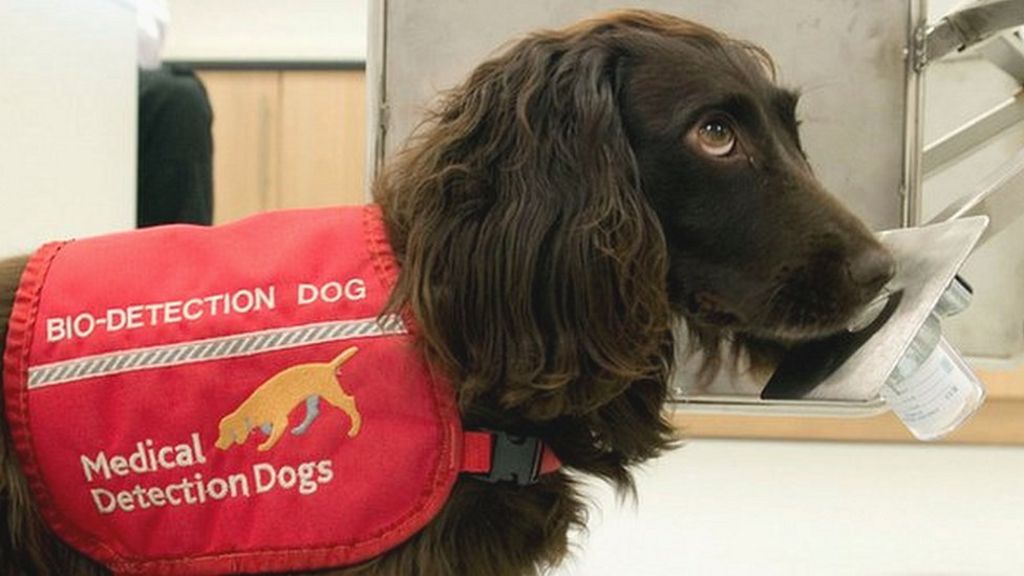Another Role Of Man’s Best Friend By Pierre Mouchette | Bits-n-Pieces Have you ever wondered why a dog stops to sniff everything in its path? Dogs use their noses to “see” the world and make sense of it. That is why dogs sniff one another upon greeting instead of shaking paws. A dog’s powerful sense of smell is also why many canines do well in search and rescue, security, bomb and fire accelerant detection, and other essential jobs.
Over the past few decades, research suggests that man’s best friend can also use smell to detect human diseases. Dogs are so effective at noticing a change in a human scent that many can sniff out signs of disease that medical tests cannot pick up. Can dogs smell cancer? Yes, it is believed that a dog’s incredible sense of smell makes it possible to actually “sniff out” cancer. Researchers have been studying dogs’ potential ability to identify complex chemical compounds in human breath, urine, and sweat. By doing so, dogs may be able to detect cancer (and other diseases). A review of several studies on canine scent detection and cancer indicated that dogs might be able to identify the following cancers from human scents:
When else are dogs used to detect diseases? In addition to cancer, some dogs are trained to recognize signs of the following five diseases. Diabetes - Thanks to their ability to detect changes in blood sugar, diabetic-alert dogs are well-known service animals. These specially-trained dogs can detect when blood sugar levels are too high or too low in people with diabetes. Research suggests that not all dogs detect unusual blood sugar levels equally effectively. It often varies depending on the person and their dog. Migraines - Dogs seem to be able to detect oncoming migraines in people, largely thanks to their sense of smell. Migraine service dog trainers believe dogs can detect migraines thanks to changes in the scent of a human’s breath before the onset of an attack. Evidence shows that dogs can detect migraines even when not trained as service dogs. People surveyed also reported that they noticed a change in their dog's behavior before they got a migraine. However, this has not been verified through formal research. Seizures - Some dogs may be able to predict seizures in humans, but it is unclear whether dogs are particularly good at it. Research suggests that dogs could recognize seizures based on the smell associated with seizures. However, not all dogs seem to be able to predict a seizure before it happens. The Epilepsy Foundation says that dogs who can predict human seizures are likely rare. Parkinson’s disease - While more research is needed, there is some evidence that dogs may be able to sniff out Parkinson’s disease. Researchers pursued this theory after determining that people with Parkinson's disease seem to have a distinct smell. So far, dog trainers from Washington State to researchers in China have shown that dogs can learn to identify Parkinson’s disease. In some experiments, researchers believe dogs can accurately detect Parkison’s disease about 90% of the time. COVID-19 - Some research studies suggest that dogs can accurately determine who has COVID-19. In some cases, dogs trained to detect COVID-19 were accurate about 92% of the time. However, the accuracy of COVID-19 detection varies. Two dogs trained to sniff out COVID-19 in San Francisco, California, for example, were correct about 80% of the time. And in some cases, these two dogs could tell someone had COVID-19 before they tested positive using an antigen test. How can dogs smell disease? Dogs detect changes in scent. The human body contains a complex mixture of chemicals that gives off a smell. Approximately one-eighth of a dog’s brain is dedicated to understanding scent. Additionally, dogs inhale approximately 300 times per minute, constantly supplying new odor particles to the cells responsible for scent. As any dog owner can tell you, dogs know a person’s smell. A 2011 research study supports this. Dogs could tell identical twins apart by smell, even if they lived in the same home and ate the same diet. So, what the dogs pick up on is a change in odor. Illness changes a person’s scent. For example, cancerous cells produce chemicals that have a distinct odor. Even in the early stages of a disease, chemicals are:
How do dogs act if they detect illness? When dogs smell illness, their behavior can change. But most often, dogs need to be trained to respond in a specific way that something is off. Some dogs are trained as official service animals for particular conditions. Other dogs are trained as part of research studies. Trained disease detection or service dogs may:
0 Comments
Your comment will be posted after it is approved.
Leave a Reply. |
Archives
May 2024
|
